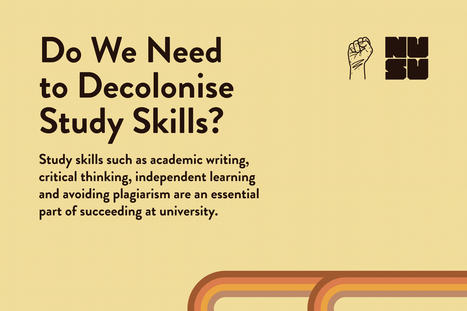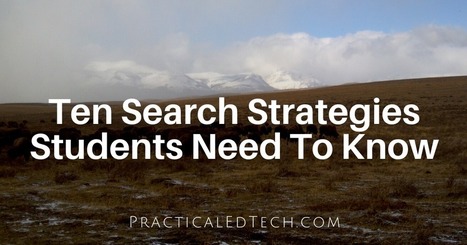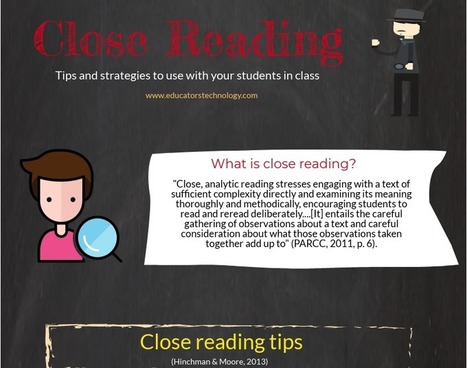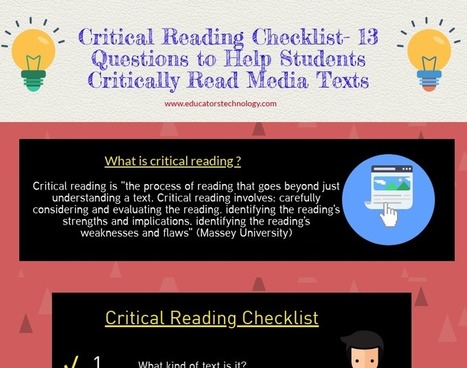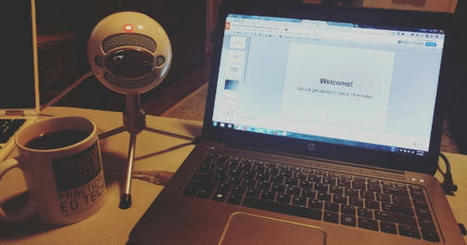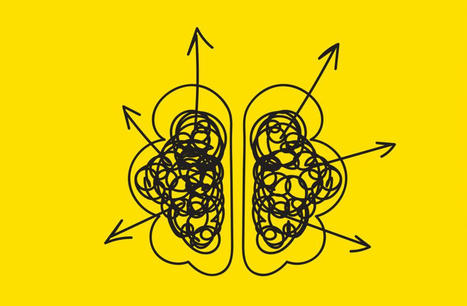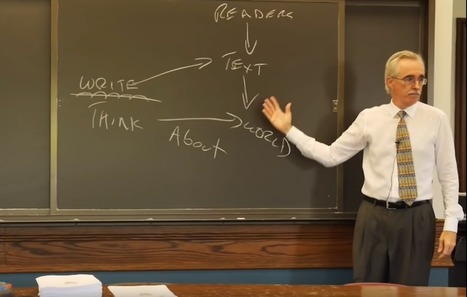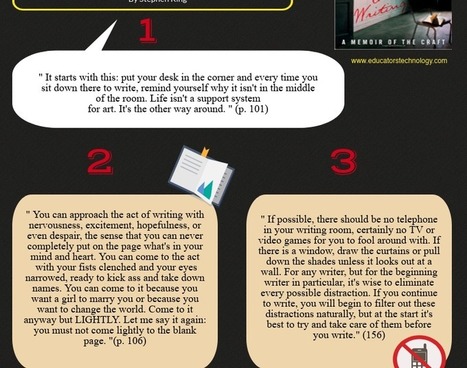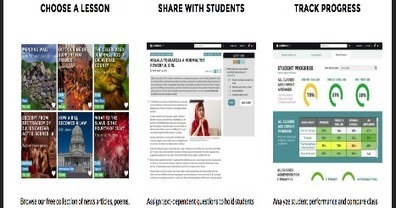 Your new post is loading...
 Your new post is loading...
Due to the difficult epidemiological situation, the dominant part of universities, colleges, and schools have switched to distance learning. It’s a common practice around the world and is helping to reduce the incidence of Covid-19. It’s quite easy for humanitarian universities to switch to online education using modern technologies, while it’s a challenge for technical ones to do without full-time laboratory work. Furthermore, primary school students and their parents faced difficulties as well. Learning remotely turned out to be challenging.
Suggestions from students who were surveyed about why cheating occurs about how higher ed institutions can help prevent it.
Via EDTECH@UTRGV
Whenever I remember how I started my instructional designer journey, the image that comes to mind is an iceberg with only a small portion sticking out of the water. The bulk of it remains hidden underneath.
I learned that it was crucial for a course creator to have lots of information and resources, but share just what learners needed to know. Another key takeaway was that materials needed to be constantly revised and updated.
Note-taking is a skill that’s critical to most reading assignments, and sound, thorough notes can help students read for deeper comprehension. The process of encoding that occurs during note-taking forms new pathways in the brain, lodging information more durably in long-term memory. Good notes can go a long way toward preparing students for tests, and they can also help reduce their stress..
The study has been cited in other peer-reviewed journals more than 1,200 times, according to Google Scholar, and it has been pointed to in op-eds and other popular articles as well. And it fit with the hunches of many “laptop skeptics,” says Michelle D. Miller, a psychology professor at Northern Arizona University, “confirming that people write more and remember less when keyboarding.”
But there’s one problem with the research, Miller points out. When other scholars have repeated the same experiment, they haven’t been able to get the same result.
Via Nik Peachey
At Newcastle this year, we’ve been beyond fortunate to have an incredible Student Union exec, a team of formidable and inspiring Sabs who have not only worked their hardest to support their fellow students through what they couldn’t have known would be one of the hardest academic years ever due to the pandemic, but who have also somewhere found the reserves of energy to engage with another critical and timely issue, decolonising the curriculum. Their Decolonise NCL campaign has to date included a series of online events attracting a seriously impressive array of speakers, as well as pulling together resources and pushing the University to pledge a commitment to decolonisation and anti-racist work at all levels. It’s simply awe-inspiring.
Choosing something that you are passionately interested in to research is a great first step on the road to successful academic writing but it can be difficult to keep the momentum going. Deborah Lupton explains how old-fashioned whiteboards and online networking go hand-in-hand, and offers advice for when it is time to just ‘make a start’ or go for a bike ride.
As part of preparing for a workshop on academic publishing for early career academics, I jotted down some ideas and tips to share with the group which I thought I would post here. In the process of writing 12 books and over 110 peer-reviewed journal articles and book chapters over a career which has mostly been part-time because of juggling the demands of motherhood with academic work, I have developed some approaches that seem to work well for me.
Learning remotely and online can present new challenges, or just put a strain on your existing learning strategies. You might be finding that you’re being provided with a lot of learning materials such as powerpoint slides, video, readings or handouts. What do you do with all this material, and how can you make sure you’re learning effectively rather than just staring at your screen, with nothing really going in?
Listen to Helen, one of our tutors, suggesting a few strategies to ensure that you’re actively engaging with learning materials and getting the most out of them.
Close reading is an essential survival skill specially now that we live in a data-saturated world where we are constantly bombarded by all forms of textual and non-textual stimuli. At its core, close reading is a metacognitive practice that allows you to achieve a deeper understanding of complex texts. It is a methodically analytical process that aims at deconstructing both the surface and deeper meanings of a text through a close analysis of its language. Close readers pay attention to syntax, lexicon and linguistic cues that can help uncover the implicit import of a textual output.
There are so many useful skills you’ll develop while doing your research – from critical thinking and being able to evaluate your work and that of others, to time management skills. But the research world is rapidly changing, so what skills can you develop now to make you ready for the research future? In this post we guide you through some of the key skills for researchers today.
Cognitive psychologists have identified six key strategies that promote learning in many situations, and this research can be implemented to promote long-term durable learning. These six strategies have been heavily investigated for decades, and there is a lot of evidence to suggest their effectiveness in a variety of situations.
Via Nik Peachey
Education plays a significant role in everyone’s lives. It helps in the growth of personality and transforming identity. Not to mention, but most of us have spent our childhood at school. During this time, we did/do many things that directly affect our lives and have been important for us in the long. Although at times, we fail to recognize its relevance, in some way or the other, they affect our lives. In our life, academic learning is one such thing that contributes a lot to make us a complete human being. Good qualities and habits get developed during this stage of life and stay with us forever. The major part of this academic life revolves around classrooms, lectures and other extra-curricular activities. Also, during this academic stage, we have to go through various grading and assessment processes, which make us confident and enhance our perseverance. For instance, academic writing is an integral part of the school module and often carries a significant amount of marks for students. Academic writing is a tedious process, and most of us write different assignments and projects just to achieve better marks. These grades play a vital role in building up our career and are crucial enough in positioning us as a scholar.
|
Karl Marx wrote a short summary of every book he read and many scholars and successful people refer to note taking as the secret of their success. I once shared a platform with Richard Branson, where he put his entire business success down to his lifetime habit of taking notes. Apart from being dyslectic, he made the simple point that we forget most of the good ideas we come up with, so taking notes prevents forgetting. He attributed almost all of his business ideas and successes to note taking.
I am also an obsessive note taker and have dozens of black notebooks which have helped me learn and plan over the years. I am often astonished, when speaking to large audiences of learning professionals, how few take notes, when the forgetting curve has been established, since Ebbinghaus in 1885, as one of best known and researched pieces of learning science.
When the COVID-19 pandemic forced me to move my courses online, I recorded my synchronous online class sessions so students could review them later. However, student feedback and reflection on my course goals revealed collaborative note-taking as an alternative way to provide a record of each class session. My first indication that recording class sessions might be problematic came halfway through the semester. One of my students, a first-generation student, I’ll call Erica, approached me to discuss her performance in the course. I was surprised to hear that Erica felt she was underperforming in class because she was consistently turning in excellent work.
As teachers and educators it behoves us to raise our students critical awareness to this informational dilemma. We need to make sure they are equipped with the required skills to help them navigate and browse the web in a safe and productive way. One way to do this is through enhancing their critical digital search literacy. We have already covered a number of interesting materials in this regard and you can check this resource to discover some practical search tips to share with your students.
Back in 2007 or 2008 I watched a professional development webinar for the first time. I can't remember exactly what the webinar was about (it was something about Second Life), but I do remember thinking that I didn't get "it." After that I watched bunch of free webinars about all kinds of things because that's what I thought I should do to be a modern teacher staying current in his practice. Finally, in late 2011 I paid to join a webinar and something weird happened, I got a lot more out of the experience. Since then almost every webinar I've attended, both free and paid, has been a good learning experience. Here's what I figured out about learning from webinars.
These management techniques can help bolster students working with heightened autonomy during virtual learning. When teachers, parents and caregivers directly explain and model these strategies, they provide students with tools to use the next time they feel distracted, pulled to procrastinate or unsure if they’re ready for an exam. With these tools, students can learn how to address these situations independently — and how to ask for the specific support they need.
Via Nik Peachey
The unfortunate fact is that few of us ever really come to grips with what it means to study, apart from sitting by oneself with a textbook for hours on end. Despite its obvious inefficiency as a learning method, we’ve all found ourselves doing that kind of “studying” at one time or another. Having taught psychology classes for 40 years, Pierce College professor Marty Lobdell has seen thousands of students laboring, indeed suffering, under similar studying-related assumptions, and in his 8.7-million-times-viewed talk “Study Less, Study Smart,” he sets out to correct them. He has also dispensed his wisdom in a book by the same title.
Academic writing has a bad reputation. “When a scholar’s vanity/insecurity leads him to write primarily to communicate and reinforce his own status as an Intellectual,” as David Foster Wallace diagnosed the problem nearly two decades ago, “his English is deformed by pleonasm and pretentious diction (whose function is to signal the writer’s erudition) and by opaque abstraction (whose function is to keep anybody from pinning the writer down to a definite assertion that can maybe be refuted or shown to be silly).” Indeed. But the disorders behind the kind of prose that inspires provocations like Philosophy and Literature‘s “Bad Writing Contest” are, if you believe University of Chicago Writing Programs director Larry McEnerney, even more basic than that.
In today's post I am revisiting this visual we published in the past which features some important tips to help you become a better writer. These tips are collected from Stephen King's book ‘On Writing: A Memoire of The Craft’ (contains Amazon affiliate link). They (tips) are less about writing mechanics and more about developing a writer's mindset. Stephen King's nuggets of wisdom are a culmination of his writing career which has spanned more than 2 decades and has resulted in numerous prestigious awards and blockbuster fiction publications.
The expansion of the Internet has opened up opportunities for knowledge acquisition. But has the Internet decreased motivation with some students and affected mental health in some cases? A new study suggests so.
CommonLit is a free website that helps students develop advanced reading and writing skills. It serves hundreds of thousands of students in classrooms across the United States. CommonLit gives teachers access to a full free digital curriculum that enables teachers to assign texts to students, score written responses, send real-time feedback and collect analytics on student progress.
First, let’s acknowledge this universal epidemic. College students despise reading textbooks and e-books that cover content with academic information. Fortunately, I discovered a cure for the reading plague that only requires five teaspoons of ingestion: 1) survey 2) question 3) read 4) retrieve and 5) review. In my class, I have found the SQ3R Method to be a step-by-step approach to learning and studying from textbooks. Although it took my students time and practice to master this method, it has been valuable in regards to preparing students for more content-driven class discussions, increased retention and understanding of information, strategic study skills, and test preparation.
You did it—you’ve officially enrolled in an online course. Now comes the challenge of figuring out how to get everything you can out of it. Thankfully, there are a few surefire, research-backed strategies for success. While you’ll want to ensure first that you’re comfortable navigating the course platform and understand the course details, the actual learning and studying part will require a careful consideration of how you, personally, operate at your best. Being mindful of your own learning habits is perhaps the most important key to succeeding in your online course.
|



 Your new post is loading...
Your new post is loading...








